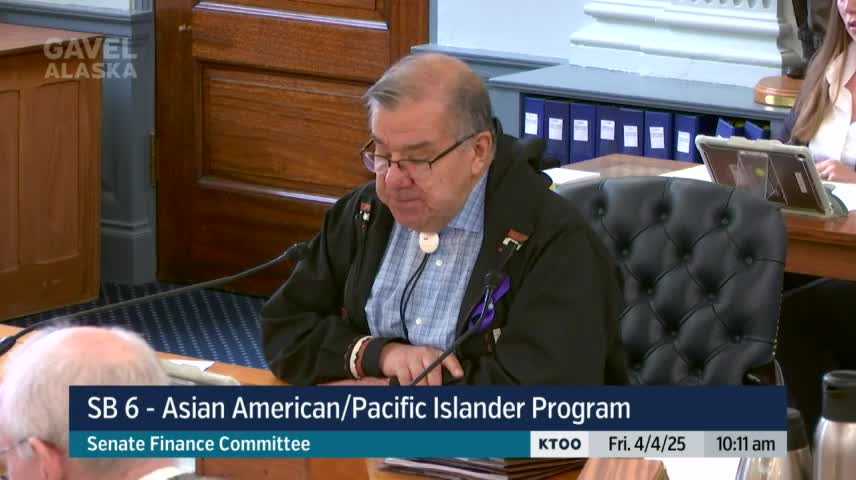Senate Finance hears bill to add Asian American and Pacific Islander history to K–12 curriculum

Summary
Senator Aldie Gray Jackson told the Senate Finance Committee that Senate Bill 6 would require school districts to establish programs integrating Asian American and Pacific Islander history and contributions in K–12 classrooms.
Senator Aldie Gray Jackson told the Senate Finance Committee in April that Senate Bill 6 would require each school district to "establish and provide to students in kindergarten through twelfth grade a program" that integrates Asian American and Pacific Islander history and contributions into the K–12 curriculum. The sponsor said the change would give students "a fuller, more comprehensive understanding and respect of the diverse cultures, histories, and contributions" of AAPI people in Alaska and the nation.
The sponsor told the committee the bill now carries a zero fiscal impact after an education committee change and that DEED has a position that will assist with implementation. "This bill now has a 0 fiscal impact after a small change in the education committee," the sponsor said.
Invited testimony came from Carol Dan, co‑director of Make Us Visible Alaska, who described the nonprofit's curricular resources and her own experience growing up Filipino American in Juneau and not learning Filipino American history in local schools until college. "When students see themselves reflected in the curriculum, it fosters a sense of belonging," she said.
Public testimony included Ray Ward, a Juneau resident and taxpayer, who praised the bill and its sponsor and said the legislation helps recognize cultural contributions across the state. Committee members asked about which grades would receive instruction, whether other ethnic groups are already included in statute, and the potential burden to districts. Senator Gray Jackson and staff explained the statute language requires districts to establish programs for K–12 and that the term "Asian American and Pacific Islander" is broad and intended to address underrepresented groups; staff said the provision was not intended to exclude other groups.
The committee closed public testimony and set SB6 aside for further consideration; members did not take a final vote. DEED's fiscal note presented to the committee was a zero note (OMB component 2,796).
Why it matters: Supporters said adding AAPI history to K–12 instruction would promote representation, reduce bullying and bias, and help students from AAPI communities see themselves in the curriculum. The sponsor described the bill as part of a larger effort to improve diversity and historical integrity in classroom materials.
Next steps: Committee staff will continue review of the committee substitute language and coordinate with the sponsor's office and DEED on implementation and any needed technical changes.

